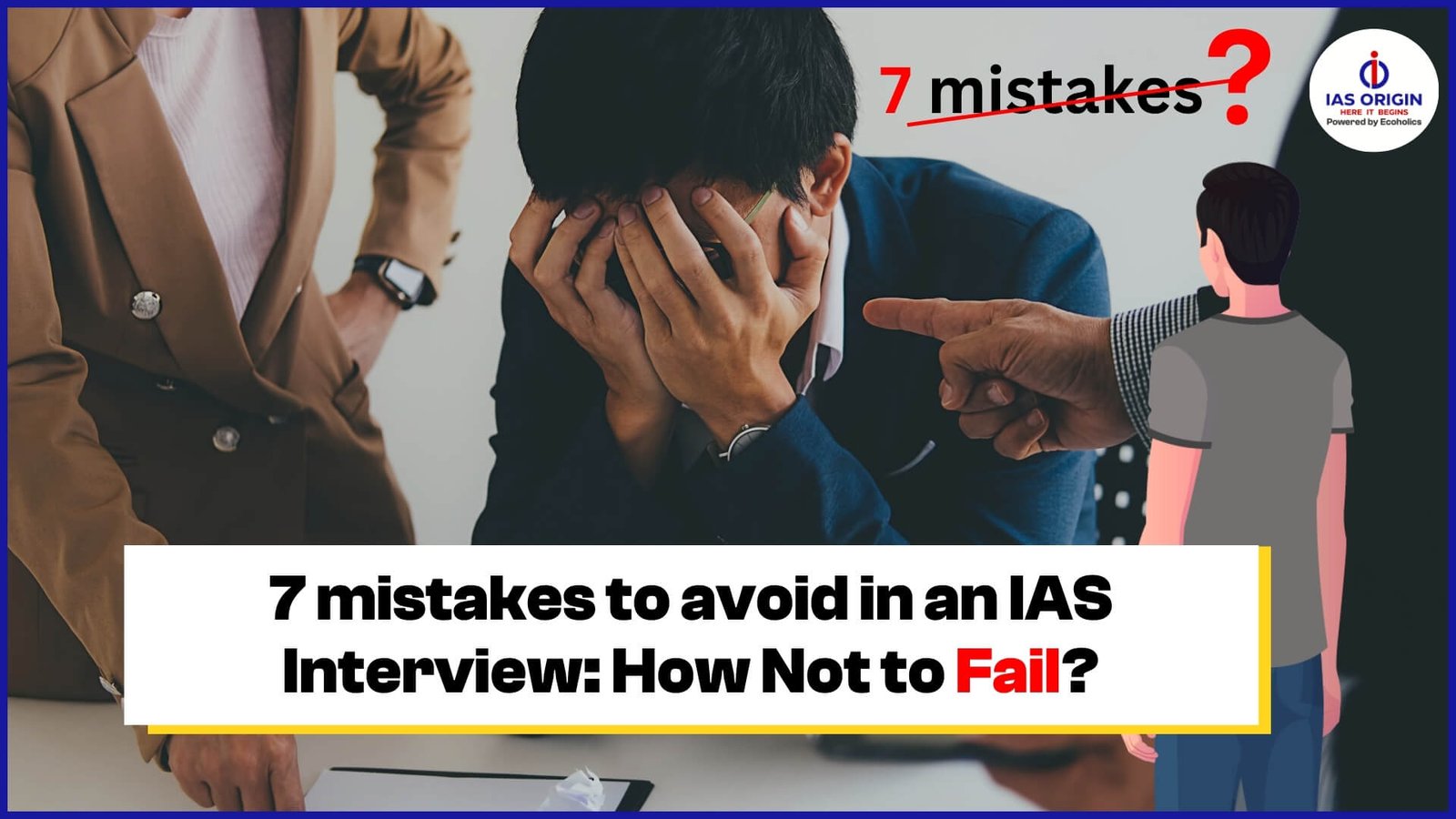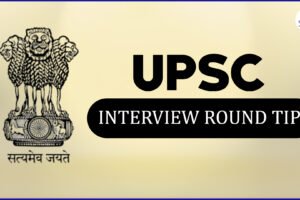
7 mistakes to avoid in an IAS Interview: How Not to Fail?
- The interview is the final stage of UPSC.
- Candidates must avoid these seven mistakes to increase their chances of clearing the interview.
If you make these seven mistakes, you can not clear the IAS Interview. These mistakes can make you go through the whole preparation all over again. Even after working hard to clear prelims and mains, failing to clear the interview is a colossal failure. A breaking point for many aspirants.
The interview panel judges the candidate on multiple aspects and assesses the suitability for administrative roles. They see how well the candidate can articulate their thoughts and ideas. Clarity of expression and logical thinking are crucial aspects of an IAS Officer.
Apart from this, the candidates are judged for knowledge and awareness, analytical ability, communication skills, leadership initiatives, interpersonal skills, ethical integrity, adaptability and composure, their hobbies and extracurricular activities, and candidates overall personality. It is highly advised that the candidates must avoid these seven mistakes to clear the interview.
Mistake 1: Underestimating Preparation
Many aspirants think they are well equipped for the interview after clearing the prelims and mains. As a result, they need to prepare for it and succeed in it. Underestimating the preparation for an IAS interview can have serious consequences, as failing in the final stage can make you start all over again.
Remember that the interview is not just a formality but a comprehensive evaluation of a candidate’s personality, communication skills, critical thinking abilities and general awareness. Also, the IAS interview is highly competitive; neglecting preparation may result in being overshadowed by other well-prepared candidates.
The interview panel can delve into a wide range of topics, from current affairs to ethics to social issues and personal background. Adequate information on either of these topics can create a good image of the candidate. The panel would try to induce stress and nervousness. Lack of focus and ineffective stress management strategies can lead to failure.
The interview panel expects the candidate to be well-informed, articulate, and possess all the qualities essential for administrative duties. Neglecting preparation can lead to failing to meet these expectations, affecting overall evaluation.
Mistake 2: Lack of Confidence
An IAS Officer is expected to radiate confidence, and a lack of confidence during the interview is not a good sign. Lack of confidence leads to hesitation, stuttering, or difficulty expressing thoughts clearly. Clear and confident communication is essential to convey your ideas and answers convincingly to create a positive impression on the interview panel.
As mentioned, the interview process can be stressful, and a lack of confidence can exponentially increase this stress. Also, it makes it difficult for the candidate to respond to the question correctly. It should be noted that trust is closely related to assertiveness. Candidates must express their opinions and stand by their convictions during the interview.
A lack of confidence may lead to a passive approach where candidates cannot assertively present their views or defend their positions when questioned. The panel might pose challenging questions, and a lack of confidence can make it easier for a candidate to handle the questions effectively.
Confidence is the key component and comes from optimal preparation. A non-confident candidate may not be able to create a positive and long-lasting impression on the panel and might lose precious marks required to clear the interview and become an IAS Officer.
Mistake 3: Lack of Proper Communication Skills
Poor communication skills can significantly impact a candidate’s performance in an IAS interview. One should remember that communication is not only how you answer but also how well you understand the question. Effective communication involves expressing your thoughts clearly and articulately.
Poor communication skills may result in difficulty in articulating your ideas, resulting in vague and confused responses. The IAS interview typically has a strict time frame for each candidate; poor communication skills may lead to lengthy and convoluted answers. It also leads to disjoint and incoherent responses.
This further hinders the candidate’s ability to connect ideas logically, making it challenging for the panel to follow the thought process. Candidates may also misinterpret the questions and struggle to understand the question accurately. Poor language skills, including grammar and vocabulary issues, can detract from the overall quality of communication.
IAS interviews often involve followup questions that require candidates to build on their initial responses. Poor communication skills may make it challenging for candidates to effectively handle followup questions, impacting their ability to provide nuanced and well-elaborated answers. Poor communication skills also lead to a lack of confidence, further deteriorating the chances of clearing the IAS interview.
Mistake 4: Improper Body Language
The interview panel closely observes a candidate’s body language as they hide multiple non-verbal cues. Avoiding eye contact may convey a lack of confidence, honesty and engagement. It further creates an impression that the candidate needs to be more comfortable and confident in the interview setting.
Fidgeting, excessive hand movements and other nervous gestures can distract the interview panel and detract from the candidate’s message. These behaviours also suggest anxiety, nervousness, or lack of control, potentially affecting the chances of clearing the interview.
Poor or slouched posture and hunching project an image of disinterest, laziness or lack of professionalism. None of these qualities should be in an IAS Officer. Crossing arms may interpret defensiveness. A closed body language makes a candidate appear physically distant or guarded, creating a barrier between the candidate and the interview panel.
Avoid constant fidgeting, tapping of feet, and playing with objects, as these may distract you and the panel. Facial expressions are also a key component of non-verbal cues. Avoid inappropriate expressions like grimacing, eye-rolling, excessive smiling, etc. Also, a lack of attention, like looking around, pursuing filler words like “um” or “uh”, or repetitive phrases can indicate a lack of preparation or confidence.
Mistake 5: Guessing or Fabricating Answers
To clear the interview, aspirants tend to answer every question even if they do not know the correct answer. This is when they indulge in guessing or fabricating the answers. Even if they think they answered the question, this mode of answering negatively affects their performance.
You can say it might be harmless if you don’t know the answer. But guessing the answer or fabricating the information lets the panel detect the subject’s lack of depth and understanding. You are further increasing the chances of failing the interview. Fabricating the answers erodes your credibility and integrity.
Civil servants must be honest and transparent and uphold the highest ethical standards. Providing inaccurate information directly goes against these principles. The interview panel is trained to assess when the candidate is answering and when they are guessing or fabricating the answer.
To ensure that you are not fabricating or guessing, they might ask followup questions you might need help answering because you need help maintaining consistency in your responses. The interview carries significant weightage in the overall selection process, and providing false information or guessing answers goes directly against the UPSC guidelines.
Mistake 6: Negativity or Biasness
An IAS Officer is expected to be positive and unbiased, and when a candidate showcases negativity or is biased during the interview, it violates the basic requirements. Expressing a consistently negative attitude or displaying biased views during the interview creates a negative impression.
The interview panel assesses your knowledge and personality—demeanour and sustainability for a bureaucratic role. Also, negativity or bias negatively affects your communication skills. Communicating aggressively or pessimistically may hinder effective interaction with the interview panel.
Civil servants are expected to make impartial and objective decisions. Now, if they are biased, it will affect their response. The interview panel looks for candidates who can uphold these values professionally. They often work in challenging and diverse environments, and biases can indicate difficulty handling administrative roles’ complexities and diversities.
Mistake 7: Lack of Personal Opinion
A lack of personal opinion or an inability to express can have positive and negative implications during an IAS interview. Civil servants are expected to be impartial and neutral in their decision-making. It can be viewed positively if you can demonstrate a lack of personal bias.
Also, maintaining a professional and unbiased stance is crucial in administrative roles. If a candidate refrains from expressing personal views, that may induce bias and is more likely to be seen as professional and capable of making fair decisions.
However, the IAS interview panel looks for candidates who can think critically and analyse the situations independently. A complete lack of personal opinion may have a negative impact. Even if neutrality is valued, the ability to articulate one’s thoughts is equally important. Failing to express your views clearly and thoughtfully might raise concerns about your communication skills.
The interview panel intelligently uses the personal opinion tool to understand your understanding of various topics. A lack of personal opinion might be interpreted as a lack of depth and engagement about the topic. Personal opinions can also be a means to assess your values and beliefs, which are essential in determining sustainability for a career in public service.
Here are the seven mistakes you must avoid to clear the final interview and become a successful civil servant. Remember never to underestimate preparation, be confident, enhance your communication skills, work on your body language, do not guess or fabricate answers, be positive and don’t be biassed, and intelligently use your personal opinion.



